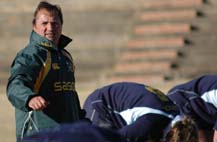Latest News Archive
Please select Category, Year, and then Month to display items
02 January 2025
|
Story Gerda-Marie van Rooyen
|
Photo Supplied
 Leading the research in South Africa is Prof Linus Franke from the Department of Soil, Crop and Climate Sciences.
Leading the research in South Africa is Prof Linus Franke from the Department of Soil, Crop and Climate Sciences.
Scientists are actively pursuing the successful breeding of diploid hybrid potatoes from inbred lines. This is expected to revolutionise potato breeding as it holds the key to rapid genetic progress. It will introduce new varieties for commercialisation through seed. Currently, existing potato variants have a gene that renders self-pollinated seeds infertile.
Prof Linus Franke, an academic in the Department of Soil, Crop and Climate Sciences at the UFS, is leading the research in South Africa. “This technology allows the production of genetically uniform potato seed that is easy to transport and largely disease-free.” He says this differs from conventional breeding whereby only vegetative propagation is possible due to tetraploid varieties in potatoes. It also risks carrying pests and diseases from one generation to the next – leading to the accumulation of pests and diseases with each round of multiplication.
Seed innovation
Prof Franke explains that Solynta BV, a seed company based in the Netherlands that produces potato varieties that can be grown from seed, has included South Africa in their research efforts because it is one of Africa’s largest producers and exporters. Through his academic relationship with Wageningen University and Research, a Dutch institution renowned for its agricultural endeavours and food production, the UFS became involved in researching hybrid potatoes grown from seed.
Diploid seeds containing two sets of chromosomes allow easier gene manipulation to increase predictability and speedier genetic progress. The breeding approach enables the incorporation of tolerance to pests, diseases, abiotic stresses (cold, heat, drought) and other desired genetic traits.
Although Prof Franke is optimistic about this research, he is not blind to disadvantages. “Potato seeds are tiny and have little energy reserves, making it harder to grow potatoes from seed than from tubers.” He says potatoes from seed will take longer to cultivate than tubers, as farmers need to grow plantlets from seeds first, adding six weeks to the growing period. “It is possible that commercial farmers can grow potatoes directly from seed. Alternatively, perhaps more likely, specialised growers will produce tubers of potatoes from seed; these tubers are then sold as seed tubers to other potato farmers, who then continue their normal practices of producing potatoes for the market from tubers.”
Financial benefits
Prof Franke says farmers have reason to get excited. “Seed potatoes will reduce input costs, as varieties with enhanced tolerance to pests and diseases require less pesticides. Planting one hectare of potatoes requires three to four tonnes of potato tubers, but only one 25 g packet of potato seeds.” Since potatoes are a more valuable commodity than maize, this technology might also increase farmers’ income potential.
Three more Kovsie staff members involved in Olympic Games
2012-05-30
 |
|
Dr Derik Coetzee
Photo: Supplied
30 May 2012
|
The South African men’s hockey team will practice on our Bloemfontein Campus from 28 May to 8 June 2012, and the team count on the assistance of three Kovsies to prepare them for the Olympic Games taking place in London later this year.
Dr Derik Coetzee, senior lecturer in the Department of Exercise and Sport Science and Head of our High Performance Centre, has been appointed conditioning coach of the team. He will be assisted by Colleen Jones and Riaan Schoeman, also from this department.
The UFS team and Mr Gregg Clark, the team’s coach, will work out a periodisation programme for the team, which will continue until the hockey finals at the Olympic Games. The programme includes the correct exercises, volume, intensity and number of exercise sessions per week.
This is not the first time that Dr Coetzee has assisted sports teams to prepare for important events. In 2007, he was the conditioning coach of the Springbok rugby team that won the World Cup in France. He was also the conditioning coach of the under-21 Springbok team in 2002 that won the Junior World Cup Tournament.
Dr Coetzee says it is a challenge to ensure that the team performs well at the Olympic Games. “The joy on the faces of the coach and players when they qualified in Japan cannot be described because many people thought they would not qualify.”
With the addition of Dr Coetzee, Ms Jones and Mr Schoeman, a total of six staff members from the UFS will be involved with the Olympic Games and the Paralympic Games. The other three are:
- Dr Louis Holtzhausen, Head of the university’s Department of Sports and Exercise Medicine, has been selected as team doctor for the more than 300 athletes that will represent South Africa at this year’s Olympic Games (in London).
- Ms Ebeth Grobbelaar, Assistant Director of the South African Testing Laboratory for Prohibited Substances at the UFS, was invited to be involved in the Drugs Control Centre in the unit against prohibited substances which will test sportsmen and -women during the games.
- Ms Hetsie Veitch, Head of the Unit for Students with Disabilities, has been invited to be a member of the Classification Panel at the final USA Paralympic athletics trials.